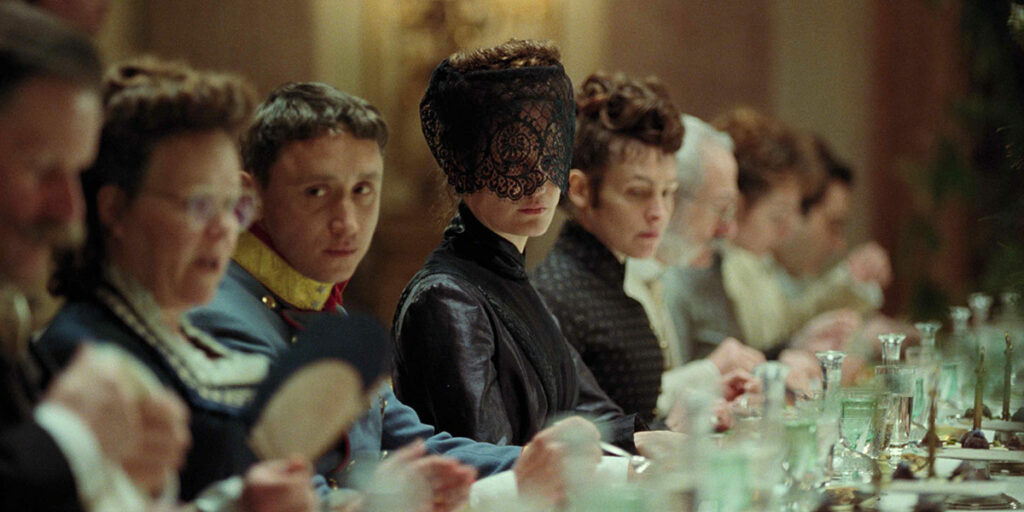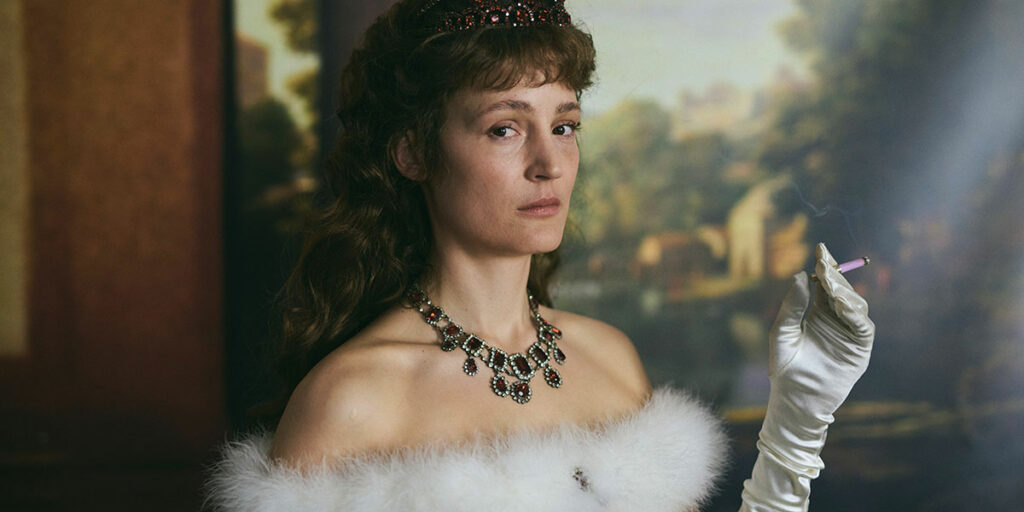With Corsage, Marie Kreutzer delivers an elegantly haunting portrait of self-determination and vanity amidst restlessness, which includes an astonishing performance by Vicky Krieps.
In the last couple of years, we have seen cinematic depictions of historical figures that don’t fit the stereotypical mold of the term “biopic”. However, most of these features end up being pretty fascinating, as they explore the deep emotions of the subject via different mechanisms by the director and crew (plays in the atmosphere and tone) or the central magnetic performance of the lead. Some recent examples are Josephine Decker’s Shirley (Shirley Jackson) and Yorgos Lanthimos’ The Favourite (Anne, Queen of Great Britain). However, two of the most fascinating in the bunch come from the same filmmaker, Pablo Larraín – Jackie (Jackie Kennedy) and Spencer (Princess Diana).
Larraín masterfully crafted the beauty of horror within the isolation of its main character, treating it like a ghost story amid a fairytale. While Jackie deals with mourning, Spencer focuses on mental health. However, both leads did a performance within a performance, acting for the people as if everything was fine with them while their insides were gnawing.
For her fifth feature, Corsage, Austrian filmmaker Marie Kreutzer wanted to add her own name to that high-standing eclectic list of polished dramas with fragility and forte. She puts a historical figure at the center of her film, one that hasn’t been shown much in the vast cinematic landscape. Her subject is the 19th-century Hapsburg Empress, Elisabeth of Austria (also known as Sissi), the wife of Emperor Franz Joseph from 1854 to 1898. Kreutzer wants to present a version of her story that focuses on her struggles, showcasing the aspect of how royalty creates a mental prison for these historical figures and how it intertwines with womanhood.
Unlike Pablo Larraín’s approach to Spencer, she doesn’t treat it as a ghost story, but she makes sure to cover the screen in a sort of despairing mist that makes the audience feel Sissi’s delirium of loneliness and seclusion, as well as her inner angst. Sissi is treasured by name only but ultimately patronized by her people around her, suited in the most expensive garments and basking upon the riches.

Kreutzer only wants to focus on a specific year instead of recapping Sissi’s entire life, the year in which she turned 40. Corsage is set in 1877 Vienna, where we see Elisabeth (played brilliantly by Vicky Krieps), known in Europe as Sissi, prepping for her 40th birthday but still longing for the days of happiness. This sparks the first instance of a melancholic hue, as the average life expectancy for a woman during those times was capped at that age. Sissi is filled with plenty of passions, but at the same time, she’s filled with equal discontent as her husband, Emperor Franz Joseph (Florian Teichtmeister), and his family are unfaithful and disloyal.
She’s also being shamed for her age and body, as Elisabeth struggles to fit into her corsage, forced to get down into a waist size of eighteen inches. The costumes in the film, primarily the ones that Krieps’ Elisabeth wears, play a vital role in the movie. The titular corsage may symbolize the symbolic disobedience to the patriarch and high order, and the black veil and dress present the act of covering one’s inner pain – almost as a sense of mourning of one’s self.
While Franz Joseph is out on meetings and affairs with essential figures, Elisabeth is left alone in the manor, spending her days in sheer loneliness as she visits the lifeless rooms one by one. A sense of restlessness is now present, along with its blue nature; we feel the pressure of solitude and anguish, not only because of the restraints put upon her in her clothing but society in general. Again, it comes back to that aspect of Spencer and Jackie putting on a mask to look the part; however, on the inside, there’s an aching sensation of dread-induced remorse.
Her only glimpses of happiness seem to come from the sight of her dogs and the occasional flirtation during her trips. Through this historical figure’s rewriting, Marie Kreutzer wants to tackle the themes of self-determination, vanity amidst restlessness, and the idea of old age and where it stands in the eyes of the high and mighty. Corsage may be a picture of someone specifically. Still, its tale of eyes looking down on you and the lack of recognizing other people’s mental struggles could apply to plenty of people who watch, creating a sense of relativity amidst the haunting glamor of an Emperor’s manor.
Although Kreutzer’s hand and pen are weighty in their thematic forte and fragility of the story, it wouldn’t have worked if it hadn’t had a strong lead attached to it. Without Vicky Krieps, this would have fallen apart; she was one of the first people who proposed the idea for this picture, and her dedication to the role is noticeable from beginning to end. Krieps embodies Empress Elisabeth of Austria with excellence; she has her moments where she’s operating for the visitors of the manor, demonstrating the duality of trying to fight for what you want and complying with the expectations of others.
She is acutely yet slowly navigating through the mental torment Sissi is going through. Her performance is divided by moments of quick wit, somber quietness, and angsty sharpness – a trio that her work in Paul Thomas Anderson’s Phantom Thread had. It is a hard act to pull off, but Krieps maintains a tall composure within the confines of an arrogant setting and gloomy atmosphere.
There’s also a transient precision in Krieps’ line delivery that elevates its themes of restlessness, as it contrasts with those of the people who shame her, like Floridan Teichtmeister’s Emperor Franz Joseph. Kreutzer manages to rewrite history during Corsage’s runtime, as he gives Sissi the sovereignty history never allowed her to have. It is not 100% historically accurate, as there is a needle drop from a very distant time, à la Marie Antoinette (2006).
However, that adds a dream-esque layer to the screen, as it breaks biopic and historical conventions – not delivering the exact old precise depictions. Corsage may not defy any of the biopic conventions. Still, it is a hauntingly beautiful and melancholic portrait of self-determination via the eyes of a historical figure of the 19th century.
Corsage premiered at TIFF on September 11, 2022 and is out now on digital and on demand.

